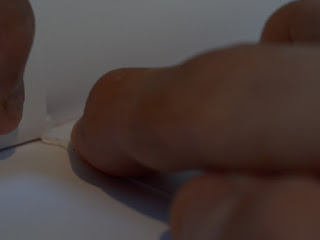I have various Tools And Things that make this sort of thing easier, but not everyone does.
The method I am outlining here is, basically, as follows:
- Identify a horizontal line along which the cut can safely occur.
- Mark this line on the first page of a set of to-be-cut-simultaneously pages
- Using binder clips, clip that set of pages together, aligned
- Cut that line with scissors as close as possible to the spine
- Gently tear the last little bit
On my trade books, I have identified the "safe" line as 5.125 inches UP from the bottom of the book. I make two pencil marks:
And draw a line connecting them, checking it as I draw for parallel-with-the-bottom:
Then I align the set of pages to be cut nicely with one another, and clip with binder clips, using a protective piece of paper under each clip to avoid marking the pages:
Check and double-check. Is the line in the proper place? Are my pages well-aligned? Is this really the right set of pages to cut? Then, carefully cut with a pair of scissors along the marked line. Scissors with a pointed tip will get you closer to the spine, longer scissors will of course make the cut easier to make straight. Take your time.
Some paper will likely remain un-cut near the spine, and the pages top and bottom will be loathe to turn nicely and independently. You'll tear out that last 1/8 inch or so. Flop the top set of pages, all together, one way and the bottom set the other. Pressing gently with fingertips, tear, extending the cut into the spine:
And now flop the top set the other way, and the bottom set the other way. Tear again, a little further, perhaps. Take your time, be gentle. It'll be OK! It looks a little ragged, but it's way in there by the spine. If you have some relatively fine grit sandpaper, you can use a bit of it to sand down and raggedness in there, and make pages turn more cleanly.
And that is how we do that with common household implements.
It would not hurt you to cut some blank paper clipped together with binder clips, to get a sense of how your scissors feel, how easy/hard it is to cut along a line, etc.






I like it. I dunno why. …the cutting part…reminds me of… something I did once…maybe in sewing? the awareness of the blades and managing their point/line-of-contact, and their movement thru an unusual/new medium. I am always hacking things up, and that's a Thing - how your scissors and the various media interact, how you manoeuvre to control that, how it can go wrong, how it can go right... and I LOVE the idea that the book is free to become something else other than what it was published as. It can be Mine, mmmmm….
ReplyDeletebut I think I might try to tear mine… I dunno. I have to look at it first.
ReplyDeleteKeep in mind that in order that the "upper" and "lower" booklets work properly, and allow you to page them separately, those middle edges must be aligned quite well.
ReplyDelete